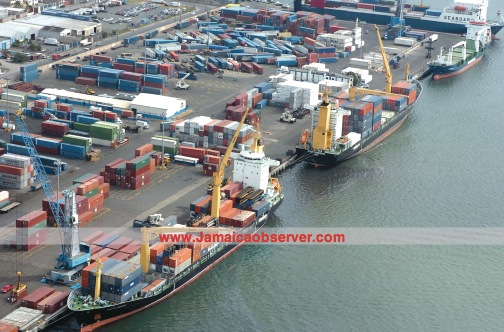The Shipping Association of Jamaica (SAJ) yesterday announced a reduction in the containerised cargo assessment charge following negotiations with some of the shipping lines that call at the port of Kingston.
The move comes amidst efforts by the shipping lines to reduce costs after a string of mergers, acquisitions and at least one line filing for bankruptcy.
Yesterday, SAJ President Kim Clarke stated in a news release that the association recognises the challenges facing the entire industry and is playing its part to ensure continued viability of all players. He added that he expects the shipping lines to reciprocate as the industry recovers lost ground.
The SAJ said assessment on import containers has been reduced from US$68.50 per container to US$37.50. Exporters, the association explained, already benefit from a low rate of US$12.00 per container. All other assessment rates remain unchanged.
“The reduction came in two tranches. In September, the rate was reduced from US$68.50 to US$52; and the latter reduction was announced on Friday, December 16, to take effect on January 1, 2017,” the SAJ said, adding that it hopes the reductions “will be shared with Jamaican importers by the shipping lines, resulting in the country being able to compete more aggressively in the region”.
The SAJ’s decision is being seen as a major sacrifice by the association in an effort to keep the lines coming to Jamaica, as the cut in the containerised cargo assessment charge will result in the SAJ losing approximately J$150 million annually.
In August this year, Hanjin Shipping filed for bankruptcy protection after months of trying to raise liquidity and restructure its debt.
The company’s collapse was reported to be the largest container shipping bankruptcy in history.
In September, Bloomberg News reported that AP Moeller-Maersk, which has ditched a strategy of building new vessels, would instead try to grow through acquisitions and was targeting Hanjin and Hyundai Merchant Marine Company.
On December 1, Maersk Line announced on its website that it had reached an agreement with Oetker Group for Maersk to acquire Hamburg Süd, the German container shipping line.
The acquisition is subject to final agreement and regulatory approvals.
“Hamburg Süd is the world’s seventh-largest container shipping line and a leader in the North – South trades. The company operates 130 container vessels with a container capacity of 625,000 TEUs (twenty-foot equivalent units). It has 5,960 employees in more than 250 offices across the world and markets its services through the Hamburg Süd, CCNI (based in Chile) and Aliança (based in Brazil) brands. In 2015, Hamburg Süd had a turnover of US$6,726 million of which US$6,261 million stems from its container line activities,” the Maersk report stated.
Yesterday, an industry analyst explained that the shipping lines had invested heavily in new tonnage at a time when global trade suffered a recession.
“So, with the downturn in trade and the competitive pressure, the lines were forced to reduce their freight rates,” said the analyst, who preferred to speak anonymously. “That resulted in some lines starting to experience problems and they were gobbled up by others. Now, with the industry about to recover, the lines are forcing ports to reduce their cargo handling charges, and Jamaica has not escaped this.”
Yesterday, the SAJ, in its release, explained that the containerised cargo assessment, also known in the trade as the “cess”, is a commercial charge which was introduced locally in 1946 to meet the cost of training and benefits for port workers, as well as the SAJ’s cost of administration. The assessment, the association said, is also charged at most United States ports as well as in Barbados.
The SAJ described its negotiations with the shipping lines as “very tense”, but said it “made huge concessions which will cause it to absorb some costs that are legitimately the responsibility of the lines to bear”.
The negotiations were facilitated by Professor Gordon Shirley, president of the Port Authority of Jamaica, and included representatives of Kingston Wharves Limited and Kingston Freeport Terminal Limited, operators of Kingston Container Terminal (KCT).
The SAJ has been largely credited with developing and deepening the steady industrial relations climate which has characterised the Port of Kingston for more than 50 years.
In 2012, just prior to the commencement of negotiations between the Port Authority of Jamaica and international port operators for a concession agreement for the KCT, the SAJ and three employee unions – the Bustamante Industrial Trade Union, United Portworkers and Seamen’s Union, and the Trade Union Congress – negotiated a historic four-year agreement with a compound increase of 12 per cent in wages for that entire period.
The SAJ noted in its release that at the time the parties stated that “their intent was to send a signal to international concessionaires that port employers and unions were united in their commitment to a stable business and investment environment for the shipping industry”.
“In November this year, barely a month after the expiry of that agreement, the parties again signed a new three-year agreement, which has been hailed as a model of collaboration between employers and employees for the benefit of an economic sector. The workers accepted a wage freeze in the first year of the agreement to allow a smooth introduction of the new concession operators at the Kingston Container Terminal,” the SAJ explained.










